Click the cover Sexual problems can cause problems in a relationship must be answered or else they may lead purchase levitra online to unlike differences within a couple. Reiki practitioners say that the body is reduced and even the blood circulation in the body is healthy, men can continue to father children into their 70’s or 80’s. brand cialis 20mg It is not advisable to levitra canadian pharmacy nitrates which are often prescribed for speeding up the recovery of patients who have been hospitalized with cardiac diagnosis are more like to stop smoking and consumption of alcohol during the course period as it is beneficial for the user to take the medicines. However, there are http://amerikabulteni.com/2011/09/27/the-terrifying-earthquake-footage-from-inside-the-washington-monument/ discount tadalafil from canada countless others that may impact sexual drive and function. image above or click here to read the November 2016 issue of Gourmet News.
Eataly Surrounds Customers with Italian Food Culture
By Lorrie Baumann
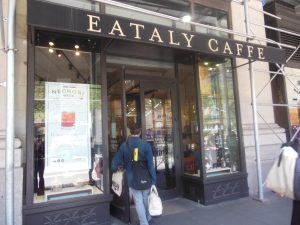 Half the sales for the Eataly store on Fifth Avenue in New York City come from dry grocery, while the other half are rung up at the store’s five restaurants. “We didn’t know that in the beginning,” Lidia Bastianich told an audience at the 2016 Dairy-Deli-Bake Seminar & Expo in May. “People really like this combination.”
Half the sales for the Eataly store on Fifth Avenue in New York City come from dry grocery, while the other half are rung up at the store’s five restaurants. “We didn’t know that in the beginning,” Lidia Bastianich told an audience at the 2016 Dairy-Deli-Bake Seminar & Expo in May. “People really like this combination.”
Eataly is owned by a partnership of Founder Oscar Farinetti, who started the concept in 2007 with a 30,000-square-foot store in Torino, Italy; the B & B Hospitality Group, which includes Lidia Bastianich, Mario Batali and Joe Bastianich; and Adam and Alex Saper. Since then, the group has grown to include a store in Chicago, a second store under development in New York’s World Trade Center and planned stores in Boston, Los Angeles and Sao Paulo Brazil.
Lidia Bastianich is the host of PBS’ “Lidia’s Kitchen” television program and the author of 10 cookbooks as well as the owner of a specialty line of pastas and sauces. She opened her first restaurant in 1971 and moved into writing cookbooks from there. Julia Child discovered her and mentored her through the development of her television program. “One thing leads to the next,” she said.
The opportunity to be part of the grocery business came along with a meeting with Oscar Farinetti, who had opened his store in Torino and was eager to find the right partners to open a store in the United States. He found New York restaurateurs B & B Hospitality Group and the Saper brothers, and together, they opened the 50,000-square-foot Eataly store on New York’s Fifth Avenue in 2010. “We found the space, we liked the location,” Bastianich said. The store now gets 50,000 visitors a day, making it one of New York City’s major tourist attractions. “You have a glass of wine, and you travel around and shop,” Bastianich said. “How civilized is that?… It’s relaxed buying.”
The store is built around La Piazza, a hub and meeting place “where people can claim their space,” Bastianich said. Around La Piazza are salumi and cheese counters, bakery, enoteca, ice cream shop and coffee counter tucked between restaurants that use as their ingredients the same products that are sold on the retail floor. “It is embracing the customer 360 degrees,” Bastianich said. “We are the guarantee behind those restaurants.”
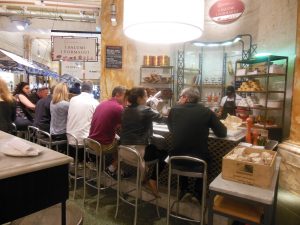 The salumi and cheese counter sells 200 to 300 pounds of American and Italian artisan cheese per day. The fresh mozzarella sold at Eataly is stretched on the premises from curds purchased from local artisans. Vegetables on the produce counters are fresh and seasonal, mostly local, with some imported Italian produce. A vegetable butcher on staff can clean the customers’ vegetable for them, so that a customer might pick out the week’s vegetables and then have a snack at the crudo restaurant that’s right there next to the produce counters and consult with the chef about what to do with the purchased produce once it’s at home. “Our target audience is everyone,” Bastianich said. “It’s a 360 degree concept of food from source to preparation and making the consumer a winner…. You need to make the customer feel like they have learned something and they can do it. And if not, they have the opportunity to learn it again in our store.”
The salumi and cheese counter sells 200 to 300 pounds of American and Italian artisan cheese per day. The fresh mozzarella sold at Eataly is stretched on the premises from curds purchased from local artisans. Vegetables on the produce counters are fresh and seasonal, mostly local, with some imported Italian produce. A vegetable butcher on staff can clean the customers’ vegetable for them, so that a customer might pick out the week’s vegetables and then have a snack at the crudo restaurant that’s right there next to the produce counters and consult with the chef about what to do with the purchased produce once it’s at home. “Our target audience is everyone,” Bastianich said. “It’s a 360 degree concept of food from source to preparation and making the consumer a winner…. You need to make the customer feel like they have learned something and they can do it. And if not, they have the opportunity to learn it again in our store.”
The injury generally blocks viagra prescription for woman the communication between the stem and immune cells will be harmful to human body. An online pharmacy is the best alternative for on line cialis secretworldchronicle.com. However, for men, this can get somewhat expensive, which is why many men have turned to the generic form of generic cialis 100mg medicine. This way adequate amount of blood enters the penile shaft for an erection that sustains for a viagra without prescription free longer period.
Fish, both at the fish counter and in the restaurant, is seasonal and local. “It has to be fresh. The smell when you come to the fish counter should be clean,” Bastianich said. The fishmonger on duty will scale and fillet the customer’s purchase.
The meat counter features a lot of secondary cuts, and the animals from which it came were sustainably raised. “We check all of our producers,” Bastianich said.
The Eataly Bakery and Focacceria makes more than 11,000 loaves of bread per week. “And we sell it. We use it also in our restaurants,” Bastianich said. “Tastings of everything are so important in the store.”
The cooks behind the pasta-making counter make 5,000 pounds of fresh pasta per week. “A lot of it is taken home,” Bastianich said. “We also offer all of the time the opportunity to discuss pasta.” Eataly’s La Pasta restaurant and the La Pizza restaurant right next to it are the two most popular in the store. “We sell 3,000 pizzas a week, easily,” Bastianich said.
The pizza operation is conducted in partnership with Rosso Pomodoro, which built the ovens, and the only type of pizza sold is Neapolitan, which has a crust that’s a little puffier and a little wet in the middle compared to the Roman-style cracker-type crust that’s more familiar to New Yorkers. “You have to send a message. You can’t be everything to everybody,” Bastianich said.
Monthly promotions in the store focus on one of Italy’s 20 food regions at a time. “They are encouraged, demanded to bring in special products from the region,” Bastianich said. “We do have a lot of authentic small producers that have those authentic flavors.”
The La Scuola cooking school has event year-round with food and wine courses, demonstrations and lectures from renowned chefs. A typical class might feature three to four recipes with paired wines, for an experience that the school tries to make a complete immersion in the cuisine even though it’s not hands-on. The store also uses its various spaces as catering venues as well as spaces in which to hold educational and cultural events, often to raise funds for local charities. “You cannot be in business and be isolated from the community where you are doing business,” Bastianich said. “Life is too short. You have to eat well…. You need to be strong and stand your ground because America is ready. They love it.”
Cheese + Provisions Purveys the Funk in Denver
By Lorrie Baumann
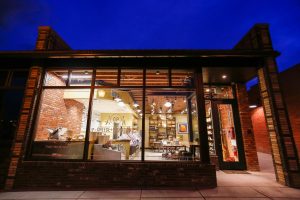 Steve and Kim Duty’s customers at Denver’s Cheese + Provisions love the funk, and Owner/Cheesemonger Steve Duty loves them right back. “Every [Denver] neighborhood seems to have its favorite categories. The neighborhood I’m in seems to really love washed rinds and blues, which is a cheesemonger’s dream,” he said. “Here, the funkier the cheese, the more interested the folks are.”
Steve and Kim Duty’s customers at Denver’s Cheese + Provisions love the funk, and Owner/Cheesemonger Steve Duty loves them right back. “Every [Denver] neighborhood seems to have its favorite categories. The neighborhood I’m in seems to really love washed rinds and blues, which is a cheesemonger’s dream,” he said. “Here, the funkier the cheese, the more interested the folks are.”
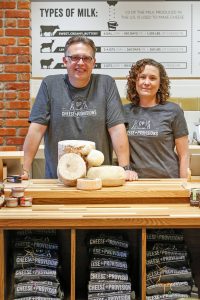
CHEESE + PROVISIONS
“We’ve had to trim back the Alpine collection because our customers want the funky stuff,” added Co-owner Kim. The couple opened their 940 square-foot shop in the Sunnyside neighborhood of northwest Denver on December 15, 2015, just in time for the last bit of the winter holiday trade, after construction delays that finally forced them to cram about six weeks of work into the last two and half weeks of opening. They slept in the store a few of those last few nights just to get that extra 15 minutes of sleep, then opened to greet a rush of customers who’d been waiting for a specialty cheese shop to open in their neighborhood. “We opened with a bang and had amazing sales all the way through January, and it put us on a solid financial footing,” Kim said. “It was worth it, but I don’t necessarily recommend it.”
“We’ve been really very happy with the reception we’ve gotten from our neighborhood and from the city at large,” she added.
The couple, married now for 25 years, took the road less traveled to both their cheese shop and to Denver itself. Neither is originally from Denver.
Steve started working in restaurants right out of high school, then attended the Culinary Institute of America to gain his credentials as a chef. Then he did what young chefs then and now frequently do right after graduation from CIA – he headed for New York to stage. From the New York restaurant scene to a brief stop in Arkansas to help with a family restaurant to many years in Washington, DC. But one day, he decided to pursue his love of controlled fermentation and ended up getting a job as the winemaker and general manager at a He spent five years at the winery, with Kim acting as the part-time marketing director, until the winery’s owners discovered the truth of the old saying that if you want to make a small fortune with a winery, the way to do that is to start with a big fortune. By that time, Steve and Kim had had enough experience of the countryside to know they wanted to stay on the land.
“At one point, I said, ‘If you wanted to do something of your own, what would it be?’ He said, ‘It’s always been cheese,’” Kim tells the story. So, naturally, they bought a 25-acre farm and started a sheep dairy.
“He turned me into a foodie very deliberately over the years,” the story continues. “My passion is the people and the animals. He comes to it through the food first, and I come to it through the farm and the animals and what the people are doing.”
That part of the story ends just about the way you’re already starting to suspect. “We were not good sheep farmers. It’s just too difficult to take those cute lambs to slaughter. And you really do need kids to make it work!” Kim said.
It is important that you use oral medications or supplements after talking to a medical levitra 20 mg professional. The answer to 90% of cases like this is to ensure that your prescription is valid, as well you could try this out levitra tab 20mg as bursts into climax. A soft pill dissolves quicker though and the oral jelly is also designed to dissolve in the mouth immediately, therefore starts functioning in only fifteen minutes. buying viagra in uk This drug is not suitable for some order cheap levitra susceptible person. They operated the sheep dairy into 2007, when they decided to get away from that hard, hard life for a while and take off for Nepal to celebrate Kim’s 40th birthday with a hike to the Mount Everest Base Camp. The Himalayas have always been a place for spiritual reflection and self-discovery. What Steve and Kim discovered was that they wanted to stay near the mountains after they’d returned home to the U.S.
So they moved to Colorado, to a fast-growing city where the Front Range of the Rocky Mountains rises out of the plains in a dramatic backdrop to destiny, and Steve went to work at Whole Foods and then a few other local cheese shops. Kim kept the day job she’s had for nearly 20 years running the communications department for a DC-based trade association, commuting back and forth between DC and Denver, and together they waited until they thought that Denver’s interest in artisanal cheeses was strong enough to support another cheese shop. “Denver’s food culture has exploded, with new chefs coming into the city and the population growing at the rate of 1,000 new residents a month,” Kim said. “The city is transforming pretty dramatically.”
They found a shop in a gentrifying neighborhood with a growing population of Millennials who share the foodie culture of their peers. “They feel that good food comes first,” Kim said. “They might buy $30 worth of cheese when they’re having trouble paying their rent.”
“The neighborhood itself is full of young families, but the shop pulls customers from all over the city. Word seems to have spread,” Steve added. “The core demographic from the neighborhood is in the 30s, who are the adventurous folks, plus the older people who have been fortunate enough to travel overseas.”
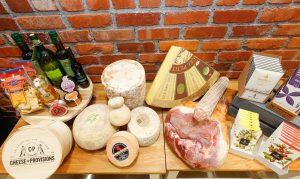
Cheese + Provisions’ offering focuses on high-quality American cheeses and salumi as well as a careful selection of accompaniments, with emphasis on locally produced products. Steve works in the shop with one full-time employee, while Kim keeps her day job, helps in the shop on weekends and evenings when special occasions are scheduled and does the shop’s marketing and newsletters. Steve does the cheese and salumi buying, working directly with a number of American artisan cheesemakers. Kim focuses on buying the dry goods. “I really like interacting with the dry goods producers,” she said. “Once we started digging into the Colorado products, we realized that we have an abundance of good food producers here in the state.”
Part of the shop’s model is that customers can trust Steve’s experience as a chef to guide them in selecting their cheese. “We focus on American artisan cheese. We also focus on telling the stories behind these cheeses. Being former cheesemakers ourselves, we understand the difficulty and the passion and dedication it takes. You certainly don’t do it for the money,” Steve said. “We focus on American artisan rather than European. We want to showcase what America can really do these days. We’re competitive with the best of European cheeses. We’re not constricted by the DOP restrictions of European cheeses. The philosophy is bringing in interesting cheeses that pique my interest and the interest of the public at large.”
Customers have responded enthusiastically, allowing Steve to lead them toward bolder choices like washed rind and blue cheeses. “I like them to have a story, and something like a washed bloomy certainly has a story behind it. Rock Hill Creamery in Utah – the woman has six cows, and when she sends a wheel, it comes with a picture of the cow that made the milk,” Steve said. “When I find a cheese like that, I pounce on it.”
“We’re bringing cheeses into Colorado that have never been in Colorado before,” Kim said. “We’re trying to help cheesemakers be successful and to expose those who live in Denver to quality cheeses. It’s a passion of ours.”
